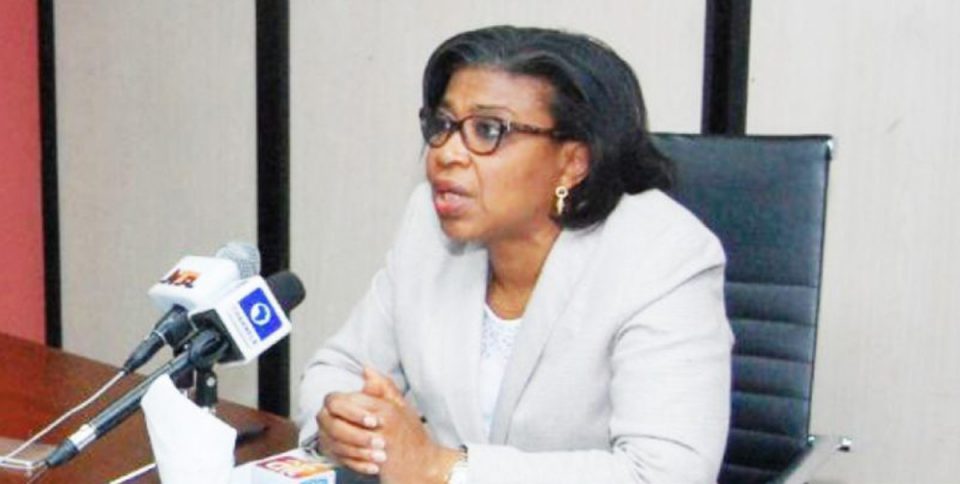The nation’s public debt stock is being increased by the petrol subsidy as the government had to borrow N1 trillion to subsidise petrol this year, the Director-General of the Debt Management Office, DMO, Ms. Patience Oniha has said.
In a presentation at the Executive Course on Budgeting and Fiscal Transparency at the Army Resource Centre in Abuja, yesterday, she attributed the current debt stock to budget deficit, noting that the borrowing plan for 2022 was increased by N1 trillion to enable the government to pay the extra cost of petrol subsidy.
Despite the public debt stock of $42.8 billion, Ms. Oniha said remained within acceptable limits and sustainable,
Speaking on the topic, Debt Sustainability Challenges and Strategic Revenue Mobilisation Initiative, the D-G said that the federal government had to resort to borrowing to fund the budget due to revenue challenges.
She said that the DMO was deploying World Bank and International Monetary Fund tools to ensure the sustainability of Nigeria’s public debt.
According to her, “These tools include an annual Debt Sustainability Analysis (DSA) and a Medium Term Debt Management Strategy (MTDS) every four years.”
In addition, she said, “Maturities in the Public Debt Portfolio are well spread to avoid bunching of maturities and to ease repayments of maturing obligations. The Domestic Debt portfolio has securities with tenors ranging from 91 days to 30 years, while the External Debt Portfolio has securities ranging between 5 years to 30 years.”
She explained that despite criticisms of the government’s borrowing, Nigeria’s debt to GDP ratio remains among the lowest globally.
She pointed out that while Nigeria’s debt to GDP ratio was 23.06 percent, countries such as Angola (136.54%), South Africa (69.45%), Ghana (78.92%), United States (133.92%) and United Kingdom (104.47%) have higher ratios.
She however stressed that Nigeria was not alone in rising levels of public debts, pointing out that across the globe, governments were borrowing more to meet with economic and social challenges posed by the Covid-19 pandemic and the Russia-Ukraine war.
“Governments across the world borrow. Globally, debt levels are growing, but it is not a new trend. Debt levels were already rising prior to Covid-19 crisis when compared to 2014. Globally, sovereign debt grew from 49 percent of GDP in 2014 to 57.9 percent in 2019 and in sub-Saharan Africa, from 35 percent of GDP in 2014 to 55 percent in 2019. In Nigeria, this ratio rose from 13 percent in 2014 to 19 percent in 2019”, she stated.
The DG also explained that the government was not just borrowing for borrowing sake, emphasizing that the loans would enable the government to finance critical infrastructure with multiplier benefits (job creation, movement of persons and goods) and overall GDP growth.
She noted that the country was facing a revenue crisis, adding that it has become very important for the government at all levels to pay more attention on how to increase revenue generation as a means of reducing borrowing.
The DMO boss noted that Nigeria was performing poorly in terms of revenue, as she said that the country had a far lower revenue record than it could generate.
She said that the federal government has taken a number of measures to grow its revenue, while urging citizens and corporate bodies to pay their taxes in order to make funds available for the government to finance the various much-needed infrastructural facilities, across the country.
The D-G added that the issuance of federal government securities had several benefits for both the citizens and corporate organisations.
They included being safe investment opportunities with regular returns and being the vehicle for mobilizing large pools of funds from domestic and international sources for investments in capital projects
She added that the development of the domestic financial sector; Liquid assets for banks and other institutions who need to hold such assets; attracting foreign investors into the domestic markets; and providing sovereign yield curves in the domestic and international markets, against which other issuers such as State Governments, private sector entities and multilaterals can issue securities to raise capital were major advantages of the exercise.




